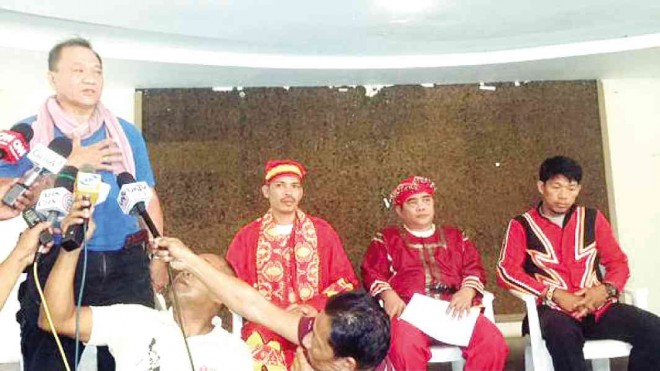
MEDIA BRIEFING Marcial Belandres (center), a tribal member who appeared in a military-organized media briefing at Camp Aguinaldo on Tuesday, is allegedly one of the leaders of the paramilitary group Magahat-Bagani. He was presented along with Rico Macat (left) and Malapandaw Nestor Apas (right). JULIE AURELIO
DAVAO CITY—The military has repeatedly denied any link with the Magahat-Bagani, which is reportedly behind the killings of three “lumad” persons in Surigao del Sur province last week, but it might have presented one of the paramilitary group’s leaders to support its claim in a media briefing in Quezon City on Tuesday.
The alleged militiaman, Marcial Belandres, appeared with fellow tribal chiefs Rico Macat and Malapandaw Nestor Apas before journalists in a briefing organized by the Armed Forces of the Philippines at its main headquarters, Camp Aguinaldo. They said the military was not involved in the killings.
Belandres told reporters that the communist New People’s Army was behind the attacks on indigenous communities that refused to support its revolutionary cause. When asked if he has proof, he said they “do not have right now.”
In a phone interview, Surigao del Sur Gov. Johnny Pimentel said Belandres was a Magahat-Bagani leader and “one of those we want arrested for harassing lumad communities.”
“It’s clear that this Magahat-Bagani is the military’s. This means that the military serves as the handlers of this group,” Pimentel said. He had earlier said the paramilitary group was created, trained, funded and armed by the military—an allegation that has been denied by the AFP.
Leader
Documents earlier furnished by Pimentel to the Inquirer identified Belandres as a leader of a paramilitary group operating in communities in the boundary of Agusan del Sur and Surigao del Sur, particularly the small-scale gold mining site in Barangay Bolhoon in San Miguel town and in Barobo town.
“They are said to have a camp in San Vicente in Barobo,” read the documents, copies of which were delivered by Pimentel to Presidential Adviser on the Peace Process Teresita Deles and Sen. TG Guingona on Monday.
The Catholic Church in Surigao del Sur has also identified Belandres as one of the Magahat-Bagani leaders. In a pastoral statement issued on Sunday, the Diocese of Tandag condemned the harassment and killings perpetrated by the paramilitary group.
It is still not clear if Belandres was involved in the Sept. 1 killing of Emerito Samarca, executive director of Alternative Learning Center for Agricultural and Livelihood Development (Alcadev); Dionel Campos, president of the tribal group Malahutayong Pakigbisog Alang sa Sumusunod (Mapasu); and his cousin, Datu Bello Sinzo.
Alcadev is a privately run secondary school for lumad students in Sitio Han-ayan, Barangay Diatagon in Lianga.
Some 250 families fled their homes in Bolhoon in San Miguel on Aug. 9 following threats by the militiamen, the pastoral statement said. On Aug. 29, the group killed brothers Crisanto and Elly Tabugol in the village of Siagao, also in San Miguel, it added.
It called for the immediate dismantling, disarming, arrest and prosecution of the Magahat-Bagani leaders and members.
Tribal leaders in Talaingod, Davao del Norte, assert that Apas, one of those presented by the military in Camp Aguinaldo, has long before turned his back from his own people after he joined another paramilitary group, Alamara.
No influence
He does not even have influence over the constituency, especially that he is not staying with the tribe in the hinterlands, Datu Doloman Dawsay said. “You cannot be a datu and stay in the lowlands.”
Dawsay said Apas was staying in his house in Tagum City, where he once slept before the attacks.
A teacher of Mindanao Interfaith Services Foundation Inc. recalled an incident on Feb. 6 when some 100 members of the Alamara and government militias led by Lito
Masaloon occupied Sitio Muling in Barangay Gupitan, Kapalong town.
The next day, soldiers from the 60th Infantry Battalion led by a certain First Lieutenant Roldan and Second Lieutenant Careño arrived along with Apas, who was wielding an
M-16 rifle, and Matol Masaloon, said the teacher, Ricky Balilid.
On the third day of the occupation, Apas, along with Roldan and Careño, summoned the teachers to the house of Olong Tiklunay, took their pictures and lectured them about the government’s counterinsurgency campaign.
“Apas told us that we should not tell other people, most especially the school administration, about our meeting,” Balilid said. Apas and the military officials repeatedly questioned their teaching methods and curriculum, he said.
The next day, about 10 Alamara entered the school and held the teachers at gunpoint for several hours.
Apas was last seen by the datus and displaced residents at a botched operation to “rescue” Manobo families who sought shelter at a Protestant-run facility in Davao City on July 23.